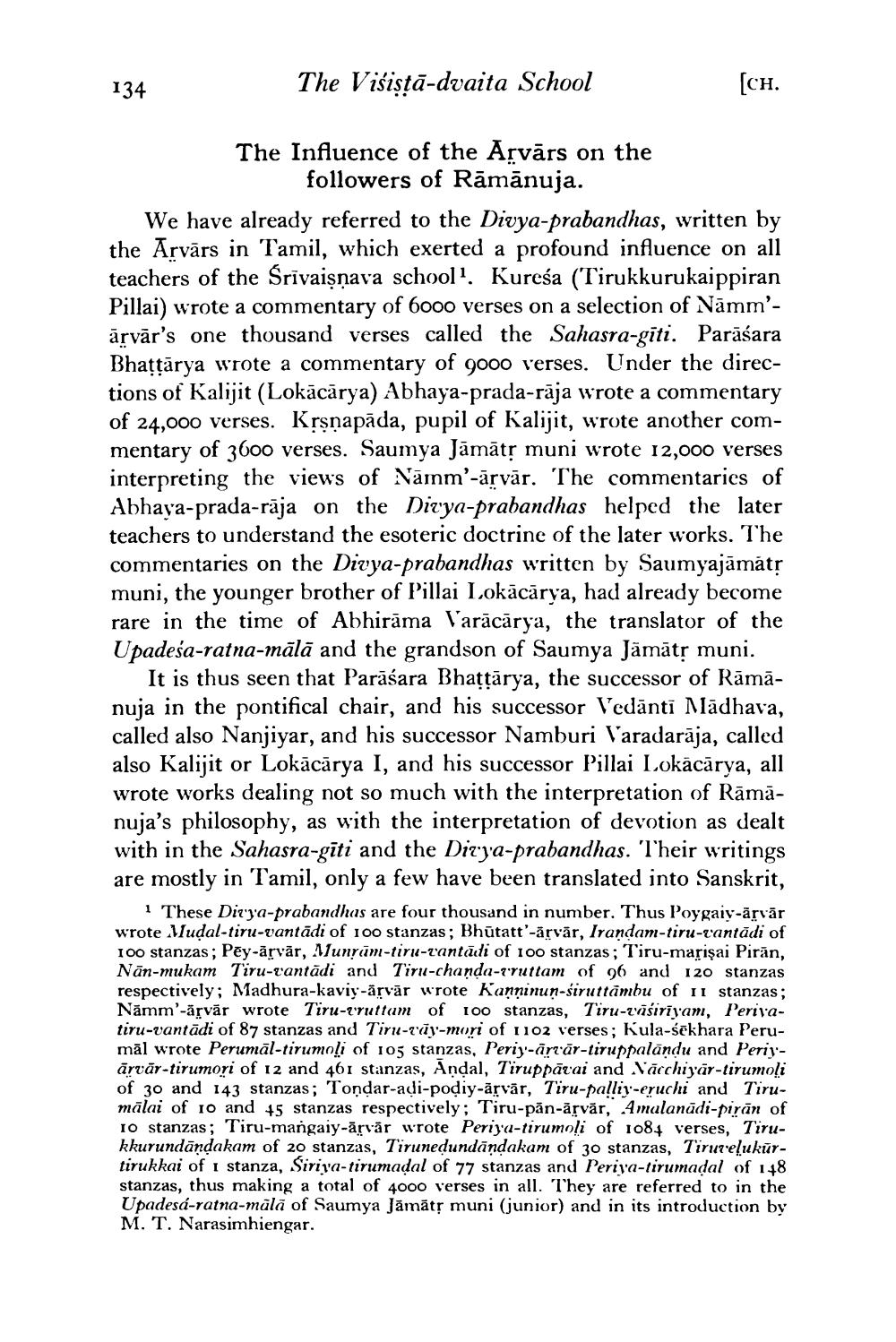________________
134
The Višistā-dvaita School
[ch.
The Influence of the Arvārs on the
followers of Rāmānuja. We have already referred to the Divya-prabandhas, written by the Arvārs in Tamil, which exerted a profound influence on all teachers of the Srīvaisnava school?. Kuresa (Tirukkurukaippiran Pillai) wrote a commentary of 6000 verses on a selection of Nāmm'ārvār's one thousand verses called the Sahasra-gīti. Parāśara Bhattārya wrote a commentary of 9000 verses. Under the directions of Kalijit (Lokācārya) Abhaya-prada-rāja wrote a commentary of 24,000 verses. Krsnapāda, pupil of Kalijit, wrote another commentary of 3600 verses. Saumya Jāmāts muni wrote 12,000 verses interpreting the views of Nāmm'-ārvār. The commentaries of Abhaya-prada-rāja on the Dirya-prabandhas helped the later teachers to understand the esoteric doctrine of the later works. The commentaries on the Divya-prabandhas written by Saumyajāmát; muni, the younger brother of Pillai Lokācārya, had already become rare in the time of Abhirama Varācārya, the translator of the Upadeśa-ratna-mālā and the grandson of Saumya Jämātņ muni.
It is thus seen that Parāśara Bhattārya, the successor of Rāmānuja in the pontifical chair, and his successor Vedānti Mlādhava, called also Nanjiyar, and his successor Namburi Varadarāja, called also Kalijit or Lokācārya I, and his successor Pillai Lokācārya, all wrote works dealing not so much with the interpretation of Rāmānuja's philosophy, as with the interpretation of devotion as dealt with in the Sahasra-gīti and the Dirya-prabandhas. Their writings are mostly in Tamil, only a few have been translated into Sanskrit,
1 These Dirya-prabandhas are four thousand in number. Thus Poygaiv-ārvār wrote Vudal-tiru-vantādi of 100 stanzas; Bhūtatt'-årvár, Irandam-tiru-tantādi of 100 stanzas; Pēy-arvár, Munrām-tiru-tantādi of 100 stanzas; Tiru-marisai Piran, Nān-mukam Tiru-tantādi and Tiru-chanda-rruttam of 96 and 120 stanzas respectively; Madhura-kaviy-arvār wrote kanninun-siruttămbu of u stanzas; Nămm'-ārvār wrote Tiru-fruttam of 100 stanzas, Tiru-zvisirījam, Perivatiru-vantādi of 87 stanzas and Tiru-ray-muri of 1102 verses; kula-śckhara Perumāl wrote Perumāl-tirumoli of 105 stanzas, Periy'-ārtār-tiruppalandu and Perijārvār-tirumori of 12 and 461 stanzas, Andal, Tiruppavai and Vacchiyar-tirumoli of 30 and 143 stanzas; Tondar-adi-podiy-āsvār, Tiru-palliv-eruchi and Tirumālai of 10 and 45 stanzas respectively; Tiru-pan-ārvār, Amulanādi-piran of 10 stanzas; Tiru-mangaiy-ārvăr wrote Periya-tirumoli of 1084 verses, Tirukkurundāndakam of 20 stanzas, Tirunedundandakam of 30 stanzas, Tirurelukūrtirukkai of i stanza, Siriva-tirumadal of 77 stanzas and Periya-tirumadal of 148 stanzas, thus making a total of 4000 verses in all. They are referred to in the Upadesá-ratna-mālā of Saumya Jāmāt; muni (junior) and in its introduction by M. T. Narasimhiengar.




